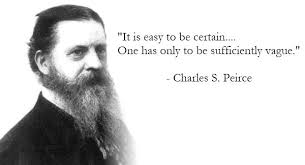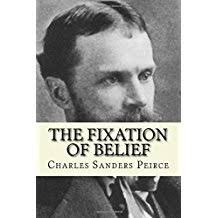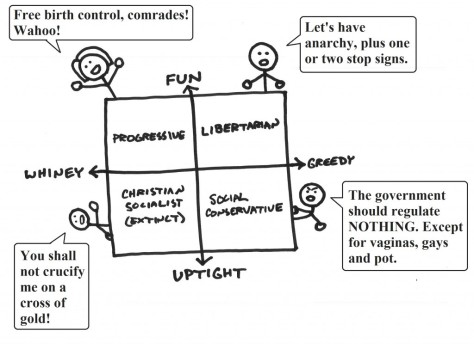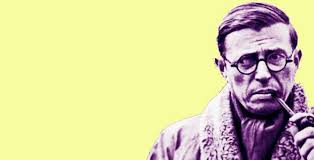
- I’ve just encountered a long-standing curmudgeonly thought of mine reflected in the thinking of Charles Sanders Peirce, the founder of pragmatism.
- My thought: You only reliably mature where, in failing to do so, you fall off the grid. So, in a modern market society, if you can’t get and keep a job, sustain a household, or manage your savings, you slip from the middle-class and fall off the social radar. But where the consequences of dysfunctional practice are sufficiently remote (and muffled with static from other factors), you neither perceive those failures nor are swept from view by them. So, you can believe all kinds of political and relgious fairy tales, or dream all kinds of fanciful futures for yourself or for humanity at large, without experiential checks and balances. You need only indulge in wishful thinking.
- Peirce’s words: “Where hope is unchecked by any experience, it is likely that our optimism is extravagant. Logicality in regard to practical matters is the most useful quality an animal can possess, and might, therefore, result from the action of natural selection; but outside of these, it is probably of more advantage to the animal to have his mind filled with pleasing and encouraging visions, independently of their truth; and thus, upon unpractical subjects, natural selection might occasion a fallacious tendency of thought.”
- Peirce quotation from “The Fixation of Belief,” in Thayer, H.S., Pragmatism: the Classic Writings (Hackett: Indianapolis, IN; 1982). pp. 64.
- By the way, a piece of college insider info: Hackett publishing has for years been the cheap standard publisher of classic texts. Online sources may now have changed that, but if you need the physical book — like when you are seriously studying something — Hackett is still the way.


For the full post, and a humorous yet thoughtful plug for moderates as against ideologues of either left or right, go to: http://www.mightyheaton.com/2012/05/28/moderates-are-pragmatists/

- “Existence precedes essence.”
- Let’s begin by applying a general rule, Rule II.1 (Exposing Weak Form/Strong Form Equivocation of my Rules for Hypothesis-Free Critical Thinking; go to Rules). For rich or difficult terms needing interpretation, always establish as the end-points of the range of plausible interpretations the weak form and the strong form.
- Those of you who took Intro to Political Theory will recognize in this my distinction between sober Rousseau and intoxicated Rousseau, those being simply personifications of the weak form and strong form interpretations.
- Weak Form: The experience acquired in trying to ahieve our aspirations changes us and devlops our potential in not always foreseeable ways.
- Who could argue with this? This is the incremental way that we amplify our best qualities and restrain our worst. We exist as creatures of formed habits but with the power to gradually and incrementally alter those habits. And, as with any new direction taken, the full prospects of that direction are not apparent until you near your destination.
- Sartre’s freedom is the freedom to choose projects, and it’s through those projects, and how we grow in the attempt, that we become who we will be.
- Strong Form: There are no fixed limits or powers to human nature.
- If this simply means that indivudal and cultural habits can change over time, it is hardly controversial.
- But it’s ambiguous.
- Our lives exist within a cascading series of limits, those of: 1) physical objects, 2) living organisms, 3) homo sapiens, and 4) language-enabled beings.
- Our limits as physical objects are fixed.
- Our limits as living organisms are fixed, unless we develop and use the power to re-engineer ourselves as cyborgs (not quite as sci-fi as it used to be).
- Our limits as homo sapiens have always been subject to change in the standard Darwinian sense. But now we increasingly have the power to accelerate that process.
- Our limits as language-users might show as an inability to escape the truths of mathematics or logic, or the intersubjective calculations of social contract or game theory.
- I think that covers the senses in which human nature is and is not fixed. (This reminds me of William James’s dictum “When you meet a (seeming) contradiction, make a distinction”.
- So, we can now make sense of the phrase existence precedes essence; it is sensible in the weak form, and true or false in the strong form depending on which of the several limits distinguished above we are referring to.
- Finally, the modern and postmodern fixation on the unfixity of both the starting-point of being human (i.e., human nature) and its end-point (ends, purposes, meaning) looks, from a more classical perspective, to be a melodramatic way of saying something well-known to Aristotle , and other ancients: practical judgment (i.e., phronesis or prudence) the art of invention triggered by the novelty of particular circumstances, is crucial to ethical practice.
- The Good doesn’t just apply itself; the agent must apply some mental and ethical elbow-grease. Sartre calls this anguish. Modern ethical theories tend to be excessively rule-based, underplaying practical judgment — the kind of thinking that fits general rules to particular realities. Aristotle knew better.
Thinking German, Talking Irish, on Big Questions, with Banter




